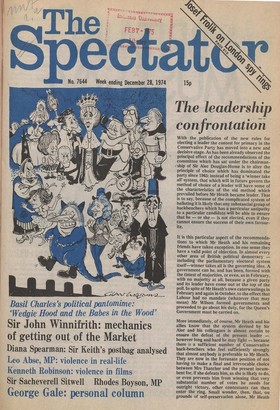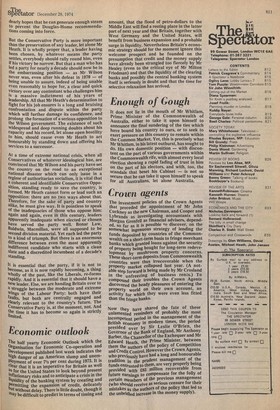The leadership
Confrontatton
With the publication of the new rules for electing a leader the contest for primacy in the Conservative Party has moved into a new and decisive stage. As has been already observed the principal effect of the recommendations of the committee which has sat under the chairmanship of Sir Alec Douglas-Home is to alter the principle of choice which has dominated the party since 1965: instead of being a 'winner take all' system, that which will in future govern the method of choice of a leader will have some of the characteristics of the old method which prevailed before Mr Heath became leader. That is to say, because of the complicated system of balloting it is likely that any substantial group of backbenchers which has a particular antipathy to a particular candidate will be able to ensure that he — or she — is not elected, even if they cannot ensure the success of their own favourite.
It is this particular aspect of the recommendations to which Mr Heath and his remaining friends have taken exception. In one sense they have a valid point of objection. In almost every other area of British political democracy — including the parliamentary electoral system itself—winner takes all is the governing idea. A government can be, and has been, formed with the tiniest of majorities, or even, as in February, with no majority at all, because a given party and its leader have come out at the top of the poll. In spite of Mr Heath's own caterwaulings in February and again in October, to the effect that Labour had no mandate (whatever that may mean) Mr Wilson formed governments and proceeded to go about his duty, for the Queen's Government must be carried on.
More immediately, of course, Mr Heath and his allies know that the system devised by Sir Alec and his colleagues is almost certain to ensure the defeat of the present leader — however long and hard he may fight — because there is a sufficient number of Conservative back-benchers who feel sufficiently strongly that almost anybody is preferable to Mr Heath. They are now in the fortunate position of not having to make a final and irrevocable, choice between Mrs Thatcher and the present incumbent for, if she defeats him, as she is likely to do, or even prevents him from winning that very substantial number of votes he needs for outright victory, other contestants can then enter the ring. Small wonder, then, that, on grounds of self-preservation alone, Mr Heath dearly hopes that he can generate enough steam to prevent the Douglas-Home recommendations coming into force.
But the Conservative Party is more important than the preservation of any leader, let alone Mr Heath. It is wholly proper that, a leader having been chosen, by whatever means the party settles, everybody should rally round him, even if his victory be narrow. But that a man who has led a party for nearly a decade should now be in the embarrassing position — as Mr Wilson never was, even after his defeat in 1970 — of being unable to assure, indeed of being unable even reasonably to hope for, a clear and quick yictory over any contestant who challenges him is a massive indictment of his years of leadership. All that Mr Heath's determination to fight for his job ensures is a long and bruising confrontation and dispute within the party Which will further damage its confidence, and Prolong the formation of a serious opposition to the Wilson government. The existence of such Widespread and deep running doubts about his capacity and his record, let alone open hostility to him, should cause even Mr Heath to act honourably by standing down and offering his services to a successor.
At a time of extreme national crisis, when all Conservatives of whatever ideological hue, are convinced that Mr Wilson and his party have set the country on the road to an exceptional national disaster which can only issue in a regime of authoritarian socialism, it is vital that a. coherent and identifiable Conservative Opposition, standing ready to save the country, is formed. Mr Heath cannot form or lead such an oPPosition: there are no two ways about that. Therefore, for the sake of party and country alike, he must give way. It is pointless to speak of the inadequacies of those who oppose him: again and again, even in this century, leaders apparently inadequate when elected or chosen have served the party well. Sonar Law, Baldwin, Macmillan, were all supposed to be second division material. Yet each led the party to a kind of triumph. But there is an enormous d. ifference between even the most apparently indifferent candidate who starts with a clean Slate and a discredited incumbent of a decade's standing.
It is essential that the party, if it is not to become, as it is now rapidly becoming, a thing Wholly of the past, like the Liberals, re-forms rapidly. And it is essential that it should have a new leader. Else, we are handing Britain over to a struggle between the moderate and extreme wings of the Labour Party: both have their faults, but both are centrally engaged and clearly relevant to the country's future. The Conservative Party is, at the moment, not. And ,tbe time it has to become so again is strictly imited
Economic outlook
The half yearly Economic Outlook which the Organisation for Economic Co-operation and Development published last week indicates the high danger of an American slump and unemPloyment of over 71/2 per cent during 1975. It is clear that it is an imperative for Britain as well for the United States to look beyond present flationary risks and to anticipate a crisis in the ugaidity of the banking system by creating and permitting the expansion of credit, delicately °tit without delay. There is little doubt, though it may be difficult to predict in terms of timing and amount, that the flood of petro-dollars to the Middle East will find a resting place in the latter part of next year and that Britain, together with West Germany and the United States, will benefit from business expansion and a probable surge in liquidity. Nevertheless Britain's economic strategy should for the moment ignore this welcome prospect and be founded on the presumption that credit and the money supply have already been strangled too fiercely by Mr Healey (even to the critical eye of Mr Milton Friedman) and that the liquidity of the clearing banks and possibly the central banking system itself is seriously in doubt and that the time for selective relaxation has arrived.
Enough of Gough
It does not lie in the mouth of Mr Whitlam, Prime Minister of the Commonwealth of Australia, either to take it upon himself to announce the final sundering of the ties which have bound his country to ours, or to seek to exert pressure on this country to remain within the Common Market. Yet, this is precisely what Mr Whitlam, in his latest outburst, has sought to do. His own domestic position — with discontent on the part of various governments within the Commonwealth rife, with almost every local election showing a rapid fading of trust in him on the part of his electors, and with, too, the scandals that beset his Cabinet — is not so secure that he can take it upon himself to speak for all Australians, let alone Australia.
Crown agents
The investment policies of the Crown Agents that preceded the appointment of Mr John Cockney as the new Chairman, and Cooper and Lybrands as investigating accountants with Morgan Grenfell as financial advisers, depended, so far as it is possible to discover, on the somewhat ingenuous strategy of lending the' funds deposited by countries of the Commonwealth on a short-term basis to fringe merchant banks which granted loans against the security of property being bought for long-term redevelopment by mushroom property concerns These short-term deposits from Commonwealth countries were thus irrecoverable when the propert y market collapsed last year. (A notable step forward is being made by Mr Crosland in the unfreezing of business rents.) To compound their troubles the Crown Agents discovered the heady pleasures of entering the property world on their own account, an activity for which they were even less fitted than the fringe banks.
Now they have shared the fate of these unlamented reminders of probably the most incompetent period in the management of the British conomy in modern times, the period presided h over by Sir Leslie O'Brien, the Governor of the Bank of England, Mr Anthony Barber, the Chancellor of the Exchequer and Mr Edward Heath, the Prime Minister, between them the authors of the policy of Competition and Cr edit Control. However the Crown Agents, who previously have had a long and honourable tradition in the prudent management of the funds entrusted to them, are very properly being provided with £85 million recoverable from future earnings to compensate for the folly of certain members of the previous management (who should receive as serious censure for their mistakes as the authors of the policy that led to the unbridled increase in the money supply).















































